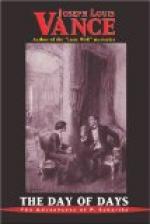“G’wan. If he’d just stalled round and refused to jump through, the author’d ’ve framed up some other way out. Why—blame it!—he’d’ve had to!”
“That will be about all for me,” said Violet. “I don’t feel strong enough to-night to stand any more of your dramatic criticism. Lead me home—and please talk baseball all the way.”
With a resentful grunt, Mr. Bross clamped a warm, moist hand round the plump arm of his charmer, and with masterful address propelled her from the curb in front of the theatre, where the little party had paused, to the northwest corner of Broadway: their progress consisting in a series of frantic rushes broken by abrupt pauses to escape annihilation in the roaring after-theatre crush of motor-cars. P. Sybarite, moving instinctively to follow, leaped back to the sidewalk barely in time to save his toes a crushing beneath the tires of a hurtling taxicab.
He smiled a furtive apology at Molly Lessing, who had demonstrated greater discretion, and she returned his smile in the friendliest manner. His head was buzzing—and her eyes were kind. Neither spoke; but for an instant he experienced a breathless sense of sympathetic isolation with her, there on that crowded corner, elbowed and shouldered in the eddy caused by the junction of the outpouring audience with the midnight tides of wayfarers surging north and south.
The wonder and the romance of the play were still warm and vital, in his imagination, infusing his thoughts with a roseate glamour of unreality, wherein all things were strangely possible. The iridescent imagery of the Arabian Nights of his boyhood (who has forgotten the fascination of those three fat old volumes of crabbed type, illuminated with their hundreds of cramped old wood-cuts?) had in a scant three hours been recreated for him by Knoblauch’s fantastic drama with its splendid investment of scene and costume, its admirable histrionic interpretation, and the robust yet exquisitely tempered artistry of Otis Skinner. For three hours he had forgotten his lowly world, had lived on the high peaks of romance, breathing only their rare atmosphere that never was on land or sea.
Difficult he found it now, to divest his thoughts of that enthrallment, to descend to cold and sober reality, to remember he was a clerk, his companion a shop-girl, rather than a Prince disguised as Calander esquiring a Princess dedicated to Fatal Enchantment—that Kismet was a quaint fallacy, one with that whimsical conceit of Orient fatalism which assigns to each and every man his Day of Days, wherein he shall range the skies and plumb the abyss of his Destiny, alternately its lord and its puppet.
But presently, with an effort, blinking, he pulled his wits together; and a traffic policeman creating a favourable opening, the two scurried across and plunged into the comparative obscurity of West Thirty-eighth Street: sturdy George and his modest Violet already a full block in advance.




